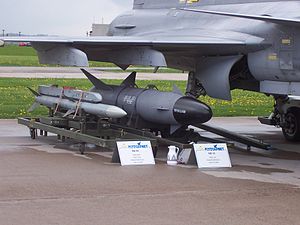RBS 15
| RBS-15 | |
|---|---|

RBS-15 on right
|
|
| Type |
Fire-and-forget anti-ship and land attack |
| Place of origin | Sweden |
| Service history | |
| In service | 1985–present |
| Used by | See operators |
| Production history | |
| Manufacturer | Saab Bofors Dynamics, Diehl BGT Defence |
| Specifications | |
| Weight | 800 kg |
| Length | 4.33 m |
| Diameter | 50 cm |
| Warhead | 200 kg HE blast and pre-fragmented warhead. |
|
Detonation
mechanism |
impact or proximity |
|
|
|
| Engine | turbojet |
| Wingspan | 1.4 m |
|
Operational
range |
70 km for RBS-15 Mk. I and II 250 km for RBS-15 Mk. III |
| Flight altitude | sea skimming |
| Speed | subsonic |
|
Guidance
system |
inertial, GPS, terminal active radar homing (J band) |
|
Launch
platform |
naval ships, aircraft and land-based missile launchers |
70 km for RBS-15 Mk. I and II
The RBS-15 (Robotsystem 15) is a long-range fire-and-forget surface-to-surface and air-to-surface, anti-ship missile. The later version Mk. III has the ability to attack land targets as well. The missile was developed by the Swedish company Saab Bofors Dynamics.
The Swedish Navy pioneered anti-ship missiles with the Halland-class destroyers using the RB08 missile since the early 1960s. The main effect of he Defence decision of 1958 for the Navy was restructuring into a lighter force consisting of fast attack craft (FAC) vessels and a halt to destroyer procurement. This posed a problem as the existing RB08 missile required launch rails and a missile magazine in the destroyers, taking up space that was not there on smaller ships. Adding to the problems, each missile had to be individually prepared for launch and only two missiles could be on the launch rails at the same time. In comparison, the P-15 Termit (NATO codename Styx) missile used by the Soviet Union (which was the expected adversary) stored the missiles in individual containers on deck which left the missiles immediately available for launch. Tests were carried out on Plejad class FACs with a single bow-mounted RB08 in the late 1960s, but they came to nothing.
Saab's next attempt at anti-ship missiles to equip the Norrköping class FACs of the Swedish navy was in 1978 under the project name "RB 04 Turbo", a development of the air force RB 04E missile with a turbofan engine, changed wing configuration and start rockets to take off from land. The initial proposal was rejected as inferior to the Harpoon. The project, under the leadership of Hans Ahlinder, then worked out a proposal for a missile with greater capabilities and superior performance to the Harpoon. To indicate that it was a new weapon the project name was changed from "RB 04 Turbo" to "RBS-15".
The first weapon contract was signed in 1979; at the last minute the Swedish government did not buy the Harpoon anti-ship missile, opting for an indigenous design. The first missiles were delivered to the Navy in June 1984, and the ship version RBS-15 Mk. I was introduced.
...
Wikipedia
